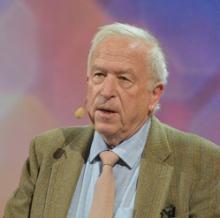
What Is It
The pursuit of truth is often thought to be "intrinsically" valuable. Scientists and philosophers, who eschew religious rationales for their life's work, take the pursuit of truth to be obviously a worthwhile enterprise. But what's so great about truth? Sure, it's good to know what's for lunch, or the nature of the disease that plagues you, but is there any intrinsic or instrumental value in knowing how far away the farthest stars are? Or whether Milton's greatest works were written while he had a headache? Or what the next layer of basic particles are like? Truth telling on Philosophy Talk with Simon Blackburn, author of Truth: A Guide.
Listening Notes
What's so valuable about truth? Ken thinks that the value of truth is obvious. Having true beliefs help us act so as to satisfy our desires. John points out that sometimes the truth can be harmful, such as knowing where drugs are being sold. There are a lot of truths that are irrelevant or trivial. There are also depressing truths. Ken thinks that you can't separate truth from believing because when we believe something, we take it to be true. Ken introduces the guest, Simon Blackburn, professor at Cambridge. John asks Blackburn to explain the nature of truth. Blackburn explains minimalism about truth, which says that there is no general answer about truth. The correspondence theory of truth says that there is some fact that makes a judgment true. However, there is no higher-order verification of this judgment. Another view is the pragmatist theory which says that the truth is valuable because it is useful.
What is the postmodernists' problem with truth? Blackburn says that the general idea goes back to Nietzsche and it is that our judgments and beliefs are formed and shaped by various forces beyond our control. Ken says that we would get around this if we had some method of tracking the truth. Blackburn says that the correspondence theory of truth works great when we are working with a straightforward representation of the world that we understand. How do we discern truth from falsehood? Blackburn thinks that is a skill that requires a lot of practice.
Some truths hurt us and some falsehoods are comforting. Should we always seek out truth for its own sake? There are a bunch of useless truths, such as the composition of dirt on Mars. Blackburn thinks that the useful falsehood is a hard idea to dispel. According to many psychologists, most people think they are about 15% smarter or good-looking than they actually are, and that keeps many people from being depressed. Nietzsche was moved to his relativism by perspectivism, which says that we view the world from our own perspective. Blackburn doesn't think that perspectivism leads to relativism because the visual metaphor breaks down.
- Roving Philosophical Report (Seek to 05:20): Polly Stryker asks several people whether we should always tell the truth.
